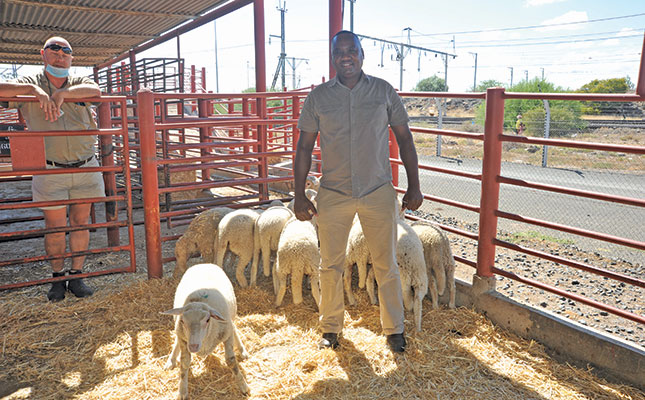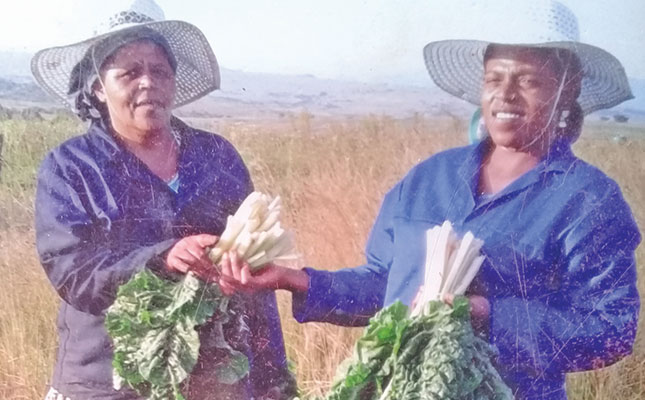
Photo: Glenneis Kriel
Stock thieves beware. If Sergeant Thabo Shedrick Moletsane is on your case, he will not stop until he has traced, arrested and brought you to trial. This is according to Captain Tiaan van Zyl, head of the South African Police Service’s (SAPS) Beaufort West Stock Theft Unit, of which Moletsane is a member.
During 2019/2020, Moletsane investigated 58 cases that led to 66 arrests. Of these, 45 went to court and resulted in 34 convictions.
READ Vital tips for stepping up security on your farm
In one case, Moletsane and the late Constable Siphosethu Ralehoko followed up on rumours of a theft in Nelspoort, Beaufort West. This led to the arrest and prosecution of two suspects before the farmer had even realised her animals were missing!
And, last year, Moletsane identified two suspects via a video recording captured by an on-farm camera, leading to the apprehension and conviction of the thieves.
“To succeed like Moletsane in the stock theft unit, you need to be a great judge of people and willing to work long, irregular hours. You also need to foster good relationships with people and build a network of informants,” says Van Zyl.
Well-planned, but swift
Speaking at Agri Western Cape’s annual gala dinner in November last year, where Moletsane received the Western Cape Stock Theft Committee’s award for Best Member of a Stock Theft Unit, Lieutenant-Colonel Johan Smit, SAPS Western Cape coordinator of stock theft, ascribed Moletsane’s success to his discipline, determination and hard work.
He said that Moletsane conducted well-planned operations and executed them in the shortest possible time, despite having few resources at his disposal.
“He goes way beyond the call of duty, never leaving a crime scene or the processing of the accused until the work is done.
“He is also incredibly humble, showing the greatest respect to everyone he encounters, from co-workers, farmers and court officials to suspects and perpetrators, and constantly seeks opportunities to expand his knowledge of stock theft.”
Jaco van den Berg, chairperson of the Western Cape Stock Theft Committee, added that investigators of Moletsane’s calibre were an asset to the agriculture sector. “We have the highest regard and respect for how seriously [Moletsane] takes his job,” he says.
Humble beginnings
Moletsane believes that his work in the stock theft unit has been a good ‘fit’ for him, and his prizes are the cherry on the cake.
“I always wanted to make a difference in my community,” he says. “Being employed in the stock theft unit right after joining the [SAPS] in 2003 allowed me to live this dream and make the most of my inquisitive nature, good people skills, sense of justice and love for animals.”
He adds that he could never have achieved his success were it not for the support of his family, colleagues and community.
“My father, Alfred Mathanzima Moletsane, who works on the roads near Beaufort West, and mother, Rhoda Vuyiswa Moletsane, who works as a domestic worker, are both extremely proud of my accomplishments. My sister Judy, who works at the Cape Peninsula University of Technology, also constantly motivates me to be my best.”
Van Zyl, who has been working with Moletsane since 2005, is one of his greatest inspirations and serves as his mentor: “Van Zyl leads by example and knows how to get the best out of us as a team.”
Stock theft prevention
Moletsane says that stock theft has increased greatly since he joined the unit, primarily because of the country’s rising levels of unemployment and the fact that stock theft is seen as an easy crime.
Most cases he investigates are of thieves taking a small portion of the livestock for their own consumption and selling the rest of the meat. But the past few years have seen a steady increase in organised theft, where large numbers of animals are stolen by syndicates.
READ Farmers say ‘not worth their while’ to report stock theft
“These crimes are far more sophisticated than when people steal for the pot, and often involve the use of specialised vehicles,” he says.
According to Moletsane, most farmers do a good job of stock theft prevention and management.
“Appearing in court to testify against suspects is time-consuming. Fortunately, most farmers understand that failure to do so can result in a perpetrator going free.”
He adds that farmers generally appreciate the importance of marking livestock properly, which is actually a legal requirement.
“The problem with unmarked or incorrectly marked animals is that it’s difficult to build a case without being able to positively identify them. There’s no proof that the animal was stolen.”
When thieves strike
Moletsane advises farmers to count their animals regularly, otherwise they won’t know whether any are missing, or if so, when the crime took place.
“Stock theft should be reported as soon as possible after it occurs. The longer you wait, the harder it is to solve a case.”
READ Top Sussex breeder’s extreme measures to beat stock theft
He adds that livestock posts, too, should be visited regularly to check on the animals. But equally, care should be taken not to follow set routines, as this could make it easier for criminals to determine when the farm is more vulnerable.
Moletsane says that technology is becoming an increasingly valuable tool in the fight against stock theft, and encourages farmers to invest in cameras to monitor hot spots such as camps near public roads.
Email Sergeant Thabo Moletsane at [email protected].










